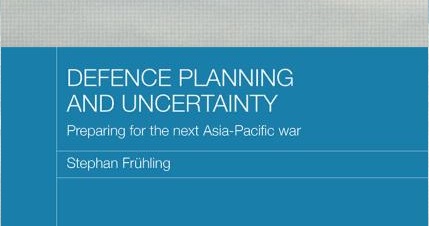Defence Planning and Uncertainty: Preparing for the Next Asia-Pacific War

My colleague Stephan Frühling has written a marvellous book on the vexed subject of how to handle the uncertainties that are intrinsic to any competent attempt at strategic-level defence planning. Based on his doctoral thesis, it is an intellectual tour de force. He posits four conceptual frameworks within which to address the interaction between planning and uncertainty, depending on the strategic circumstances of the nation making the plans and the policies of its political leaders. He uses eight case studies from Australia, New Zealand and the United States to illustrate the application of these concepts.
Planning based on net assessment focuses on situations where there is ‘one dominant, well-understood and immediate risk’. Mobilisation planning focuses on risk ‘that is uncertain because the threat is only prospective, and may arise at an unknown point in the future’. Portfolio planning pertains to situations in which risks from ‘several known potential adversaries’ need to be addressed. And task-based planning is appropriate for situations where risks and adversaries ‘are unknown, unexpected or not well understood’. Stephan offers a critique of how US policy towards China has evolved since the end of the Cold War, at times using elements of all four of his frameworks. He rounds out the book with some speculation about planning for conflict in the Asia-Pacific and with some more general reflections about defence planning and uncertainty.
Stephan’s text repays a close reading, for it abounds in important observations. He reminds us that judgements are needed about ‘the nature and durability of the current international order’. This is as true today as it was in the Cold War, although now in different geo-strategic circumstances. How the Abbott government handles this complex judgement in the new Defence White Paper, planned for later this year, remains to be seen. His bagging of the concept of ‘requirements’ appeals too. It is good to be reminded, in the context of how the US has thought about China, that the former doesn’t always get it right, as our political leaders would do well to remember. And his comment that ‘successful planning at the strategic level is the exception rather than the norm’ is strangely cheering, all things considered.
On some matters though, I would contest Stephan’s judgements. To my mind, he overstates his argument that in the 1980s, Australia used a net assessment approach to defence planning and Indonesia. We were, of course, interested in what Indonesia was doing and planning, but not at the obsessive level that the term net assessment implies. And I believe he is too critical of Australia’s ‘core force’ concept. It was not so much that ‘the lack of a credible adversary … was the core failing’ but rather, because there was no credible adversary, the idea of the core force had to be adopted. In practice, it was a useful part of the conceptual armoury for defence planning. It was easier to apply to the Navy and the Air Force than to the Army (or to defence industry for that matter), but that reflected a different set of issues. The influence of the core force faded with the retirement of those most associated with its development (principally Tange, Pritchett, Blakers, and Cawsey).
There is an interesting issue about sources: we all use documents such as White Papers and Quadrennial Defence Reviews for our research. But these are milestones on a never-ending journey, not destinations; they represent only the tip of the iceberg of strategic thinking at the time. There is always other important thinking going on in the background which doesn’t make it to the final draft, often for security reasons. So is it fair to base criticism of policies on what such documents do and do not say? Up to a point, yes, for they should have a vital role in telling a country’s citizens how their government is discharging its obligations to provide security. But even documents that fall short in some respects are still highly useful in ensuring that issues of defence planning are addressed in a way that, overall, is consistent. In any event, it would be good to hear if the present White Paper team has read Stephan’s book, for it’s an important contribution to the literature.
Stephan Frühling, Defence Planning and Uncertainty: Preparing for the next Asia-Pacific war, Routledge, 2014.
Reviewed by Dr Richard Brabin-Smith, Visiting Fellow at the Strategic and Defence Studies Centre of the Australian National University.





